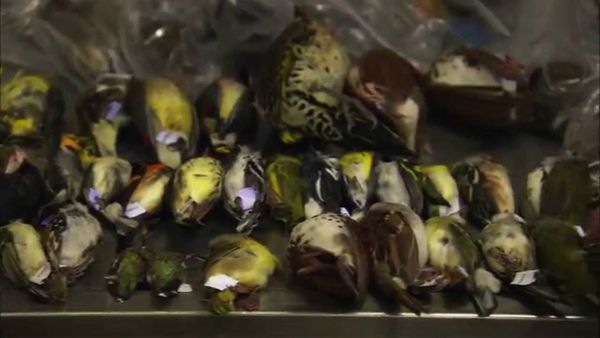Eye For Film >> Movies >> The Messenger (2015) Film Review
The Messenger
Reviewed by: Jennie Kermode

In Islamic tradition, the hoopoe bird is considered to be a holy messenger through whom missives might be passed to another world. All around the world, there are traditions that have connected birds with the divine, admiring their freedom to fly where they please and taking great joy in their singing. This film, however, notes that birds also act as another kind of messenger. Because they are so quick to respond to environmental changes - like the canary in the coalmine - their silence warns us when things are going seriously wrong.
The silence is growing louder. It's hard to make precise estimates, given the migratory nature of many species, but few experts are in doubt that we are currently witnessing a mass die-off. This film brings together birdwatchers, amateur and professional, from many different parts of the globe. They all tell versions of the same story. The songs they are hearing are fewer in number and fewer in kind. Those divine voices are disappearing.

What's behind it all? Su Rynard's team investigates many possibilities. Neonicotinoid pesticides are clearly causing problems for some species; due to work done by activists trying to save bees, this threat may be a temporary one, but Rynard shows admirable balance in explaining what makes them so attractive to farmers. Similarly, she makes room for a resident of the Landes in France to explain why trapping and eating a particular kind of bird appeals to him so much that he will beak the law to do it. Of course he'll stop if scientists convince him the species is truly endangered, he says. But by then, might it not be too late?
Some problems are surprisingly easy to solve. Bird smashing themselves to death against the sides of skyscrapers can be stopped simply by placing dots on the glass with magic marker, making it obvious that it's not open space without significantly impacting human enjoyment of the view. Others challenges are so monumental that they may leave the viewer feeling hopeless. Research suggests that migratory birds are missing important parts of the spring season because climate change is making the weather so erratic, so they risk freezing to death or being unable to feed their nestlings when they return to their northern summer homes.
There are some actions we can take, of course. Simple things like setting up a bird feeder can save lives, and that part of the equation is perhaps underexplored here, but most viewers should think of it for themselves. The impact of this film is assured in two ways. Firstly, through the telling of histories like that of Mao Tse Tung's disastrous campaign against birds deemed vermin, which not only drove them to the brink of extinction but, because they were not there to eat the insect pests who ate the crops, led to the deaths of millions of human beings. Secondly, through the endless depiction of tiny, beautiful corpses, sometimes gently held in the hands of researchers, sometimes arrayed in rows and circles; individual losses devastating in their mass.
Everything in this film is beautifully, evocatively shot, and effectively scored by the birds themselves. It's not a film you'll forget in a hurry, even if some of those voices are never heard again.
Reviewed on: 17 Nov 2015














